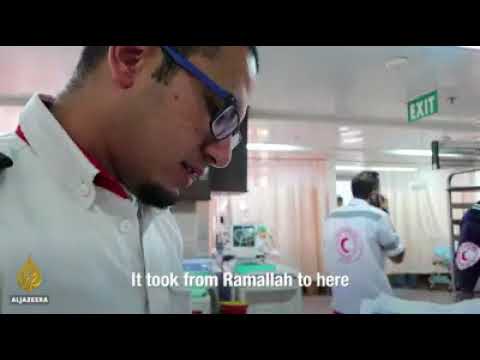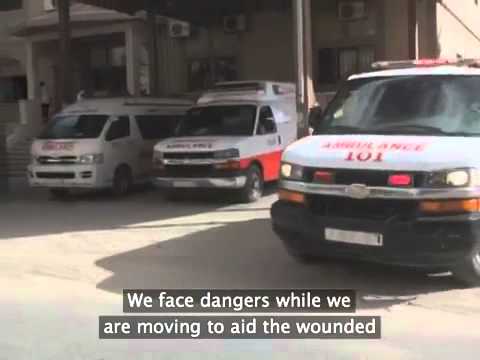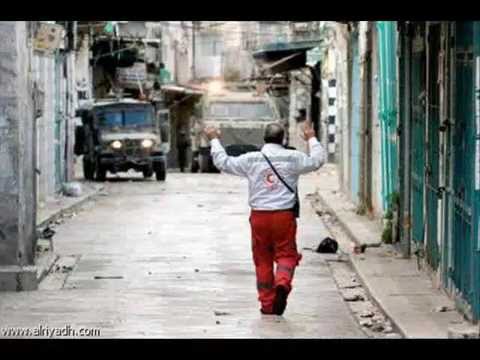Palestine Red Crescent Society
My Travel Story
PRCS History
PRCS strives to ease human suffering through its Emergency Medical Services (EMS), preventive and curative health care services, rehabilitation, volunteer activities, and programs promoting social and cultural development, with a focus on the most vulnerable members of the society. PRCS also focuses on the dissemination of the humanitarian values, the fundamental principles of the International Movement of the Red Cross and Red Crescent, in addition to International Humanitarian Law.The Palestine Red Crescent Society was mandated in 1969 to provide humanitarian, health, cultural and social services when and where needed to the Palestinian population. Following the 1993 Oslo peace accord and the formal establishment of a Ministry of Health (MOH) by the Palestinian Authority (PA), PRCS, in 1996 and 1999, was mandated by the Palestinian Authority to provide National Ambulance and Blood Transfusion and Pre-Hospital Emergency Services in oPt and Health Service in the Diaspora. The PRCS assumed the role of a complementary body to the public authorities, targeting the needs of the most vulnerable and disadvantaged groups within the Palestinian population. The PRCS has become one of the main non-profit providers of medical and social welfare services in the oPt. Despite the many obstacles and difficulties, the PRCS persists in providing humanitarian services and support to its people, through its branches in Palestine, as well as in Arab countries where Palestinians reside in large numbers.The PRCS is a full member of the International Movement of the Red Cross and Red Crescent, and therefore adheres to the Movement’s basic principles: humanity, impartiality, neutrality, independence, voluntary service, unity and universality.The deteriorating humanitarian situation in oPt and Diaspora, coupled with the continued financial crisis, internal strife and recurrent Israeli military incursions into the oPt, put more strain on the National Society’s ability to provide essential services to the population as a result of increased numbers of people requiring emergency care in hospitals and health centre’s.The Palestine Red Crescent is one of the largest and most reliable provider of health care and social services in the West Bank and Gaza Strip. It is also the only provider of secondary health care services to the Palestinian refugees in the Diaspora ( Lebanon, Syria, Egypt and Iraq) . Due to the financial crisis in oPt and serious lack of job opportunities for Palestinians in Lebanon, there are very few options for the Palestine Red Crescent to generate income from its programs and services. This leaves it vulnerable and dependent on external funding. With years of deteriorating economic and humanitarian conditions, and with periods where the authorities could not provide health care and social services, the importance of the Palestine Red Crescent has increased
Mission
To provide humanitarian assistance, health and social services to the Palestinian people when and where needed. That is to prevent and alleviate human suffering wherever it may be found, to protect life and health and ensure respect for the human being, in times of peace and armed conflict and other emergencies, to work for the prevention of disease and for the promotion of health and social welfare, and to encourage voluntary service.
Vision
PRCS will be the leading humanitarian organization responding to the needs of the Palestinian population including the Diaspora, delivering quality humanitarian services and disseminating the Movement’s Principles and International Humanitarian Law, with continued commitment to leveraging inaccessibility and inequality to health and social services, supporting the rights of vulnerable groups.
Strategy
PRCS Mandate and Legal Basis:
PRCS was founded on 26 December 1968. In September 1969, it was mandated by the sixth session of the Palestinian National Council held in Cairo to provide humanitarian and health services to Palestinians wherever they may be.In 1996, the Palestinian National Authority charged PRCS with the responsibility of providing Emergency Medical Services to Palestinians in the occupied Palestinian territory.PRCS complements the Palestinian Health Ministry and is a full member of the International Red Cross and Red Crescent Movement. As such, it endeavors to promote the health and social conditions of Palestinians.
The Seven Fundamental Principles of the International Movement:
1. HUMANITY
The Red Cross and Red Crescent, born of a desire to bring assistance without discrimination to the wounded on the battlefield, endeavours – in its international and national capacity – to prevent and alleviate human suffering wherever it may be found. Its purpose is to protect life and health and to ensure respect for the human being. It promotes mutual understanding, friendship, co-operation and lasting peace amongst all peoples.From this key principle stem the six other foundations of the International Movement. It is with these words that the Movement calls for tolerance, patience, forgiveness, mercy and caring,inter alia.
2. IMPARTIALITY
The International Movement makes no discrimination as to nationality, race, religious beliefs, class or political opinions. It endeavours only to relieve suffering, giving priority to the most urgent cases of distress.
This principle includes the three following elements: non-discrimination, the provision of help based on need, and impartiality.1. Non-discrimination: This is the Movement’s second most important principle, and is linked to the principle of humanity. The Movement does not apply distinctions to human beings in the provision of services, providing care and assistance to all those in need in an equitable manner. It believes that discrimination is among the root causes of conflicts and wars.2. The provision of help based on need: Also called ‘equitableness’, this principle means the provision of relief in a manner that takes into account how much people are suffering or how urgent their needs are.3. Impartiality: impartiality in its true sense requires that subjective distinctions be set aside. It obliges the Movement’s members to provide services without favoring or prejudice. It also requires an objective and detailed examination of problems and a continuous effort to avoid all potential bias.
-
Campaign Ended
$ 0 USD
Total Donation Received-
0%
Funded -
$ 10,500 USD
Goal Amount -
0
Days Left
-
-
Cost Calculator
-
Accommodation
$ 5,000
-
Program Fee
$ 5,000
-
FundMyTravel Site Fee
$ 500
-



